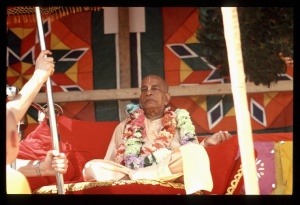CC Adi 5.153

A.C. Bhaktivedanta Swami Prabhupada
TEXT 153
- rāma-lakṣmaṇa—kṛṣṇa-rāmera aṁśa-viśeṣa
- avatāra-kāle doṅhe doṅhāte praveśa
SYNONYMS
rāma-lakṣmaṇa—Rāmacandra and Lakṣmaṇa; kṛṣṇa-rāmera aṁśa-viśeṣa—particular expansions of Lord Kṛṣṇa and Lord Balarāma; avatāra-kāle—at the time of incarnation; doṅhe—both of Them (Rāma and Lakṣmaṇa); doṅhāte praveśa—entered into Them both (Kṛṣṇa and Balarāma).
TRANSLATION
Śrī Rāma and Śrī Lakṣmaṇa, who are plenary portions of Lord Kṛṣṇa and Lord Balarāma respectively, entered into Them at the time of Kṛṣṇa’s and Balarāma’s appearance.
PURPORT
With reference to the Viṣṇu-dharmottara, the Laghu-bhāgavatāmṛta explains that Rāma is an incarnation of Vāsudeva, Lakṣmaṇa is an incarnation of Saṅkarṣaṇa, Bharata is an incarnation of Pradyumna, and Śatrughna is an incarnation of Aniruddha. The Padma Purāṇa describes that Rāmacandra is Nārāyaṇa and that Lakṣmaṇa, Bharata and Śatrughna are respectively Śeṣa, Cakra and Śaṅkha (the conchshell in the hand of Nārāyaṇa). In the Rāma-gīta of the Skanda Purāṇa, Lakṣmaṇa, Bharata and Śatrughna have been described as the triple attendants of Lord Rāma.